Hair Loss (Alopecia) and Erectile Dysfunction: Are Hair Loss and ED Connected?

While alopecia itself doesn't directly cause erectile dysfunction, the two conditions are often linked through shared factors. Hormones like DHT and testosterone play different roles, DHT contributes to hair loss while testosterone supports sexual function. The psychological impact of losing hair can affect confidence and sexual performance, though this is usually mild. More significantly, common hair loss medications like finasteride and dutasteride can cause ED as a side effect, sometimes even persisting after stopping treatment. Both conditions may also stem from the same underlying issues like chronic stress, poor sleep, or hormonal imbalances. If you're experiencing ED while treating hair loss, don't stop medication abruptly, consult your doctor to check hormone levels, adjust treatment, and explore evidence-based ED solutions alongside lifestyle improvements like exercise, stress management, and better sleep habits.
Can alopecia cause erectile dysfunction? It’s a question many men quietly wonder about, especially when hair loss and changes in sexual performance seem to appear around the same time. While alopecia itself doesn’t directly cause erectile dysfunction, the two can be connected through shared hormonal, psychological, and medication-related factors.
In this article, we’ll explore how hormones like testosterone and DHT, stress and self-image, and even common hair loss medications such as finasteride can play a role in both conditions. You’ll also learn how to identify the real cause behind your symptoms, what the science says about their link, and the safest ways to manage ED while treating hair loss.
Can Alopecia Cause Erectile Dysfunction?
Alopecia itself doesn’t directly cause erectile dysfunction, but both conditions share some common risk factors. Studies show a clear link between hair loss and erectile dysfunction through hormonal, psychological, and medication-related factors.
In simple terms, alopecia may not cause ED, but it can be connected to it through shared biological and emotional pathways.
Alopecia doesn’t cause erectile dysfunction directly, but the stress, hormone changes, or medications involved can sometimes play a role. It’s more about the body’s balance than the hair itself.
According to Allo Health, every 1 in 2 patients has ED, which is based on our internal clinical data of more than 2.5 Lakh patients who come to our clinic.
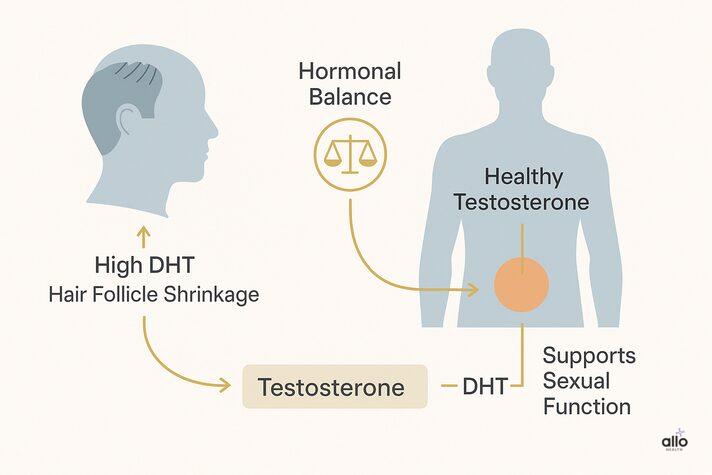
How Hormones Link Hair Loss and Erectile Dysfunction
Hair loss and erectile dysfunction both involve hormonal balance, especially the androgen pathway. These conditions are mainly influenced by two key hormones, DHT (dihydrotestosterone) and testosterone.
DHT and erectile dysfunction don’t have a direct relationship. High DHT levels can lead to alopecia (pattern hair loss), while healthy testosterone levels are essential for sexual desire and function[1]. In simple terms, too much DHT can cause pattern hair loss but not necessarily ED, and too little testosterone can.
Interestingly, some factors that trigger male pattern hair loss might actually support sexual health. For example, DHT, the same hormone that contributes to baldness, is produced as a byproduct of testosterone, which plays a positive role in maintaining sexual performance.
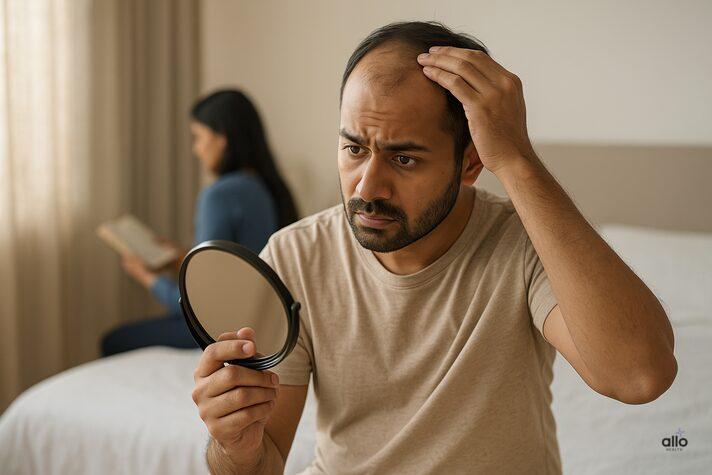
Psychological Impact of Alopecia on Erectile Dysfunction
While alopecia doesn’t physically cause erectile dysfunction, it can have strong psychological effects that influence sexual health.
Studies[2] show that people with hair loss, especially those with alopecia areata, often develop a negative body image. They may feel less attractive or confident, which can lead to low self-esteem, anxiety, or even sexual performance issues. When someone feels ashamed or dissatisfied with their appearance, it can reduce sexual desire and make arousal more difficult.
For some men, hair plays a big role in how they see themselves. Losing it can create stress or emotional discomfort that affects their sexual confidence. But, research on androgenetic alopecia (male pattern baldness) shows that, for most people, the psychological distress is mild and manageable, not severe or permanent.
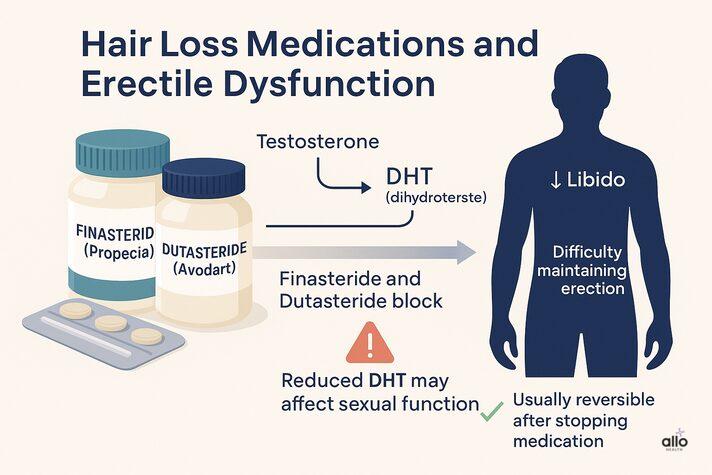
Hair Loss Medications & Erectile Dysfunction
Common hair loss medications such as finasteride (Propecia) and dutasteride (Avodart) can sometimes cause erectile dysfunction as a side effect.
A study[3] found that long-term use of these medications might increase the risk of persistent erectile dysfunction, even more than conditions like diabetes, high blood pressure, or smoking.
Both finasteride and dutasteride[5α-reductase inhibitors] work by reducing the hormone dihydrotestosterone (DHT), which helps slow down hair loss. But lowering DHT can sometimes lead to side effects such as reduced sexual desire, erection difficulties, or ejaculation problems in a small number of men.
These effects of 5α-reductase inhibitors usually improve after stopping the medication, but in rare cases, they may continue, a condition known as post-finasteride syndrome[4].
Other drugs used to treat severe hair loss, like systemic corticosteroids or cyclosporine, have also been linked to sexual side effects in some men.
In short, if you’re experiencing ED while taking hair loss medication, it’s likely the treatment, not the alopecia itself, that’s causing the problem.
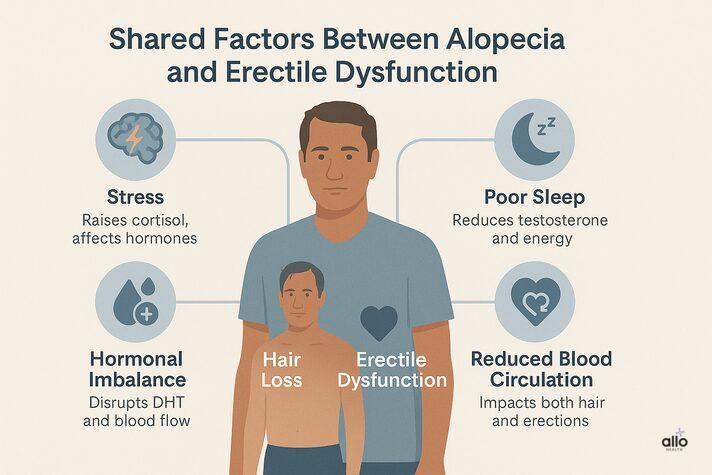
Shared Factors Between Alopecia and Erectile Dysfunction
Hair loss and erectile dysfunction often share common underlying health factors. When hair loss happens alongside low energy, mood changes, or sexual performance issues, the root cause may be the same: things like chronic stress[5], poor sleep[6], cortisol imbalance, or hormonal changes.
For example, long-term stress can affect the body’s hormone balance and reduce blood flow, which impacts both hair growth and erectile function. In this way, alopecia and erectile dysfunction may be different signs of the same deeper health imbalance, rather than unrelated conditions.
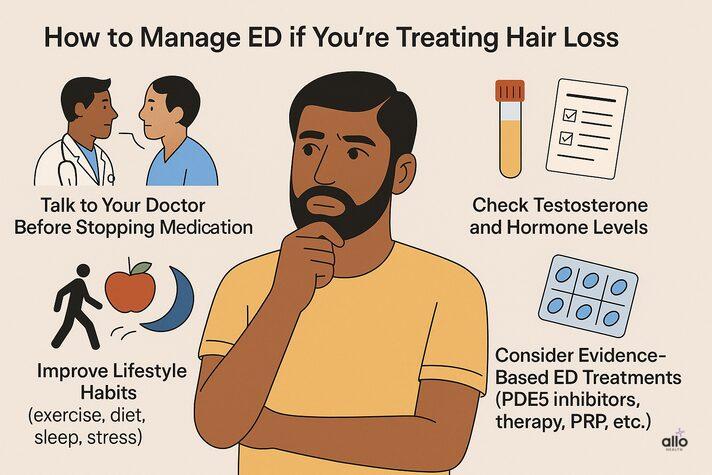
How to Manage ED if You’re Treating Hair Loss
If you’re experiencing erectile dysfunction while using hair loss treatments, don’t panic; there are safe and effective ways to manage it.
1. Talk to Your Doctor Before Stopping Medication
Never stop taking finasteride or dutasteride suddenly without medical advice. Your doctor can help you determine whether the medication is causing the problem and may suggest adjusting the dose or switching to another treatment.
2. Check Testosterone and Hormone Levels
Low testosterone or imbalanced hormones can affect both hair growth and erections. A simple blood test can identify hormonal issues early.
If needed, your doctor may recommend lifestyle adjustments or therapy to help rebalance your hormones naturally.
3. Improve Lifestyle Habits
Healthy habits are one of the best natural ways to manage ED. Regular exercise, good sleep, a balanced diet, and stress management all improve blood flow, energy, and confidence.
Reducing alcohol and quitting smoking can also make a big difference in sexual health and hair quality.
4. Consider Evidence-Based ED Treatments
If ED persists, proven treatments like PDE5 inhibitors (Viagra, Cialis, etc.), psychotherapy, or even PRP therapy can help.
Many men recover their sexual function after finasteride with medical support and lifestyle care. The key is to act early and stay consistent with your treatment plan.
Key Takeaways
Can alopecia cause erectile dysfunction? The answer is both yes and no. Alopecia itself doesn’t directly cause erectile dysfunction, but the hormones involved and the medications used to treat hair loss can sometimes contribute to it.
If you’re noticing ED symptoms while treating alopecia, don’t ignore them. Talk to your doctor, as they can help you figure out whether your medication, hormones, or other factors are causing the issue and guide you toward the right treatment plan.
"The following blog article provides general information and insights on various topics. However, it is important to note that the information presented is not intended as professional advice in any specific field or area. The content of this blog is for general educational and informational purposes only.
Book consultation
The content should not be interpreted as endorsement, recommendation, or guarantee of any product, service, or information mentioned. Readers are solely responsible for the decisions and actions they take based on the information provided in this blog. It is essential to exercise individual judgment, critical thinking, and personal responsibility when applying or implementing any information or suggestions discussed in the blog."






